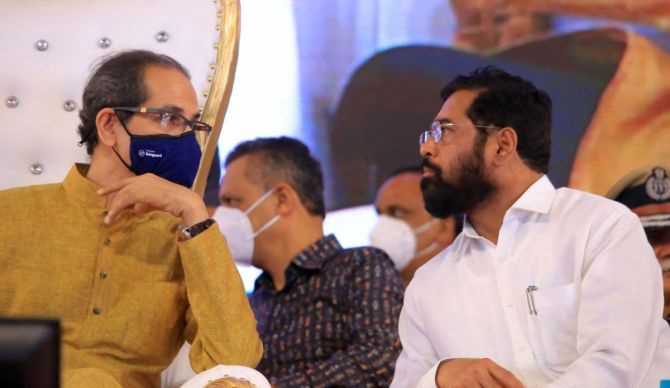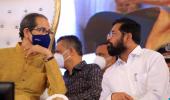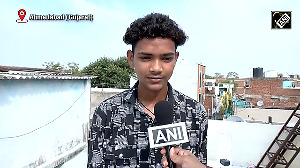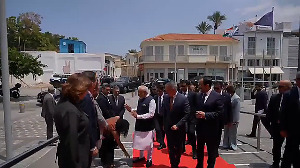'Approaching the Supreme Court, getting a favourable decision and overturning the situation (the speaker's order), will be too much to ask for in too short time.'

Legal expert Chinmay Bhosale, who has a doctorate in malicious prosecution and is a partner at the 44-year-old law firm S R Bhosale discusses with Prasanna D Zore/Rediff.com the nuances and legalities that fall short of the directions issued by the Supreme Court when it ordered the speaker of the Maharashtra assembly, Rahul Narwekar, to decide the disqualification of 16 Shiv Sena MLAs belonging to Eknath Shinde's Shiv Sena.
Was the order given by Maharashtra Speaker Rahul Narwekar along expected lines?
Legally speaking, it is surprising because even if the Supreme Court had said that the speaker has to give the decision, they (the Supreme Court bench) had clearly given the mandate on which that decision was to be taken.
If you read the concluding paragraphs or other points of the Supreme Court judgment dated May 11, 2023, it specifically stated quite a few things. One being that the consequence of a split in a party cannot be a defence or a point of consideration while deciding the disqualification (of MLAs belonging to Eknath Shinde's Shiv Sena or Shiv Sena Uddhav Balasaheb Thackeray).
Secondly, it had also said that while deciding this issue (disqualification of 16 MLAs belonging to Eknath Shinde's Shiv Sena), the point of contention is whose political party was it (the then Shiv Sena when Eknath Shinde along with 15 MLAs went to Surat on the intervening night of June 21-22, 2022, the day on which a whip was issued by then Shiv Sena whip Sunil Prabhu to discuss the cross-voting that had happened during the June 10 Rajya Sabha elections in Maharashtra).
(According to the Supreme Court judgement) It is immaterial to whom the legislative party belonged to or towards which leader majority of MLAs were leaning towards.
What is material was that whose political party was it (the Shiv Sena before or during the intervening nights of June 21-22, 2022) which issued the whip.
Factually, if we see the point at which this issue began, it was principally at a time (June 21-22, 2022) when there was no question of the Election Commission being approached by either of the parties to decide whose political party and whose legislative party it (the Shiv Sena) was.
Right now (in its order dated January 10, 2024), the speaker (Rahul Narwekar) has said that political party belongs to the Shinde faction. But that was not the question on the day and time when the whip was issued by the party (then the united Shiv Sena) and the order was given to all the MLAs (including those who went to Surat with Eknath Shinde) to be present (at the meeting as per Prabhu's whip).
Principally, if you see legally, on the day (on the intervening night of June 21-22, 2022) on which all this entire ruckus happened, at that time, there was just one party; there was no claim of another party.
The question of there being a split and then proving on whose side, after the split, does the majority goes, is immaterial because the law says the split cannot be a legal point of contention for this decision (disqualification of 16 Shinde faction MLAs). And that's very clear in the Supreme Court judgment.
Has Speaker Narwekar then faulted in his order in arriving at a decision sidelining the directions given by the Supreme Court?
My point is that the law can be interpreted in multiple ways and as has been interpreted by the Supreme Court, it doesn't look like the current decision (given by Narwekar) is on the same page as the Supreme Court's directions.
Of course, the Uddhav Thackeray group is at liberty to approach the Supreme Court and challenge this decision
What options does Uddhav Thackeray and the party which he heads, the Shiv Sena Uddhav Balasaheb Thackeray, have now?
The Shiv Sena UBT has the option of approaching the Supreme Court to challenge this particular decision. However, at a practical level, it might not be as useful because aachar sanhita (the Model Code of Conduct by the Election Commission of India) will be declared anytime now for Lok Sabha elections and there's not much time left even for the (tenure of the ) assembly (of Maharashtra) period to get over (Maharashtra elections will be due in October 2024 when the term of the Eknath Shinde government ends).
So probably, approaching the Supreme Court, getting a favourable decision and overturning the situation (the speaker's order), will be too much to ask for in too short time.

On what grounds can the SS-UBT now challenge the speaker's order in the Supreme Court? Could you explain the finer legal points on which this order can be challenged in the Supreme Court?
One principle is that the Supreme Court had directed Mr Narwekar to decide whose political party is it, not otherwise, in the current judgment (which was tabled by the speaker on Wednesday, January 10, 2024).
Secondly, he had to decide the validity of the continuation of the MLAs and disqualification of the MLAs only specifically on these finer points:
One, he (the speaker) had to not rely on the split being a legal defence right now, because the Shinde faction's defence is that they had a split (on the intervening night of June 21-22, 2022) and therefore, they were not bound to obey the whip which was issued by Mr Thackeray (Sunil Prabhu, the then Shiv Sena whip but before the Shinde faction elected Bharat Gogawale as its chief whip after going to Surat and Guwahati), and hence they were not present for that particular meeting, and, therefore, the anti-defection law cannot be applicable to them, is what their defence is.
The Supreme Court is very clear in stating that it is a settled law, that it is not a ground in itself to be argued or taken into consideration in this particular decision.
Having said that, if that is taken a recourse to because right now that's what the recourse has been taken (by the Shinde faction), that there was a split and they had the majority (of MLAs) and the Shinde faction was not liable to obey the people (the whip issued by Sunil Prabhu) and therefore they cannot be disqualified.
The Supreme Court had made it clear that the split cannot be a ground right now to be considered. On that basis also, they (the SS-UBT) can go ahead and challenge it.
Thirdly, and most importantly, is that all this which has happened -- that consequently the Election Commission was approached and they gave the judgment in favour of the Shinde faction, etc. -- happened post facto.
Meaning: on the day (intervening night of June 21-22, 2022) when all this happened and that whip was issued (by Sunil Prabhu) and given to all the party members (including to the 16 MLAs, including Eknath Shinde, who went to Surat that night) to be present on that particular day and time there was no question of a second party (Shinde's faction of Shiv Sena) or a challenge to the symbol (the Shiv Sena's election symbol -- the bow and arrow, which was given to Eknath Shinde's Shiv Sena by the Election Commission) and all those things that happened (when the Shinde faction approached the Election Commission for giving it the party name and the election symbol).
Lastly, the Supreme Court is very clear again on another point in that judgment: That it will be that particular whip (of Sunil Prabhu's) which was in effect then and was to decide the functioning of the voting as on June 21-22, 2022, because that's another argument of theirs (of the Eknath Shinde faction) that the way in which it (Prabhu's whip) was communicated to them was not right and therefore they (the 15 MLAs who accompanied Eknath Shinde to Surat without voting for the election of Rajya Sabha MPs from Maharashtra) didn't follow (Prabhu's whip).
What made Speaker Rahul Narwekar ignore these finer legalities involved in the direction given by the Supreme Court?
Essentially, he has gone on the legal principle that whoever proves the majority (of MLAs supporting a particular faction when a political party splits) actually does control the political party which, by law and the symbols order if you read, is right.
But as I said, all of that (the Eknath Shinde faction approaching the Election Commission and winning the right to the Shiv Sena party and its election symbol, the bow arrow) happened post facto.
What are the salient features of the order given by Maharashtra Speaker Rahul Narwekar?
- He has stuck to the mandate of him being the first and primary authority to take a call on this. That was a point of contention where the Supreme Court takes the decision or he (the speaker) takes the decision. He has gone ahead and taken the decision. That's now a settled principle that the speaker is the authority to take call on disqualification.
- Second, he has dismissed the petitions of the SS-UBT group seeking disqualification of the 16 MLAs including the current chief minister (Eknath Shinde).
- Third is that he has gone ahead and rather considered the floor test of the majority party to consider the current disqualification and stated that the political party belonged to the Shinde group and therefore they were not bound to listen to the whip issued by Sunil Prabhu.
- And lastly he has said that UBT being the president back then of the party (the united Shiv Sena) didn't have the power because of the split to take any decision seeking disqualification of any MLAs.
The speaker also said that the 1999 constitution of the Shiv Sena was taken into consideration and not the one established in 2018 when Uddhav Thackeray became the president of the Shiv Sena...
That again is a point of contention actually because the law states that whatever the constitution (of a political party), the final authority remains the chief of that party, which was Uddhav Balasaheb Thackeray, to be very honest, at that point in time (when the Sena MLAs left for Surat on June 21-22, 2022).
The law (governing the constitution of political parties) says that the veto power remains with the chairman (chief) of that particular political party. But that has been bypassed in this order by (the Maharashtra assembly speaker) stating that the political party (Shiv Sena) only didn't belong to Uddhav Balasaheb Thackeray.











